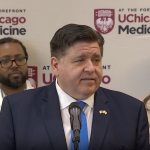
OSF HealthCare, partners plan Medicaid innovation collaborative to address health needs
The Illinois Department of Health and Family Services (HFS) has announced that $750 million in funding is being made available over a five-year period to focus on community needs, with an emphasis on addressing social and structural determinants of health. The funding will look to improve health and wellness for individuals and communities, tailor solutions to meet the unique needs of specific communities, and invest in projects that improve outcomes, decrease disparities, and are sustainable over time.
In response to this opportunity, OSF HealthCare, in partnership with UI Health Mile Square Center (Chicago, IL), Heartland Community Health Center (Peoria, IL), Chestnut Health Systems, Inc. (Bloomington, IL), Eagle View Community Health System, Inc. (Oquawka, IL), and Aunt Martha’s Health Center (Danville, IL) has applied for over $137 million in state of Illinois Medicaid Transformation funding to be used to support the Medicaid Innovation Collaborative, which will focus on the unmet health needs of some of the most vulnerable populations in Illinois.
The collaboration of Medicaid providers will build a layered approach to care that allows for scarce resources to be maximized in addressing systematic obstacles to better health. The collaborative will utilize the latest tools and techniques in telehealth medicine, pairing them with on-the-ground community-based programs delivered by the Federally Qualified Health Center (FQHC) partners and local community-based organizations (CBOs), creating scalable solutions that can improve access and quality of care for Medicaid patients throughout the state.
By partnering with a combination of FQHCs, CBOs, and other community groups, this collaborative will create an approach to health care delivery that is genuinely responsive to the needs of local communities being served.
Innovative technologies and knowledge gained from the OSF OnCall Digital Health work as the developer of a statewide Pandemic Health Worker (PHW) program during the early days of the COVID-19 pandemic will lay the groundwork for the new initiative. Utilizing a centralized team of caregivers, including physicians, nurses, pharmacists and wellness coaches, as well as resources at the community level, it is expected that more than one million extra touch points of care would be delivered to Medicaid beneficiaries over the next five years.
“OSF HealthCare will support innovative digital models enabling a new level of care for our most vulnerable populations. The FQHCs, using community health workers supported with digital tools and AI technology, will address social determinants of health and the health disparities most prevalent in the communities they serve,” explains Michelle Conger, CEO of OSF Digital Health. “While OSF HealthCare is the lead entity applying for the Medicaid transformation dollars, our partner entities will be the face of the collaboration in the community.”
Highlights of the Medicaid Innovation Collaborative:
- Potential for approximately 170 new health care jobs spread across the service area
- 1 million episodes of care for Medicaid patients over a 5 year period
- Coverage across a wide geography, with services delivered to potentially up to a third of the state
- Partnership between 5 FQHCs, a dozen-plus CBOs, and three minority-owned vendors
- Solutions provided to address the unmet health needs of vulnerable populations related to behavioral health, mom-baby wellness, and chronic disease management
- Care will be provided in a way that respects the communities the collaborative is serving, is culturally appropriate, and recognizes the challenges and barriers that continue to exist in marginalized communities.
“The Medicaid Innovation Collaborative builds off of every partner’s strength,” says Henry Taylor, president and CEO of Mile Square Health Center in Chicago. “For OSF HealthCare, it is their experience with innovation, analytics, and the deployment of new digital technologies to improve quality and access to care. For us, an FQHC partner, it is our existing relationships with the Medicaid population, our focus on care coordination, and the ability to understand the concerns of the populations we are serving.”
In addition to creating greater access to care via the OSF OnCall platform, the collaborative will take immediate steps to improve local access to care.
“The American Dental Association recognizes that the mouth is a window into the health of the body. The Collaborative will significantly expand dental care for Medicaid patients in the Bloomington-Normal area,” said David A. Sharar, Ph.D., chief executive officer of Chestnut Health Systems in Bloomington, Ill. “A long-term goal is to expand dental care and improve oral health for patients in counties throughout Illinois.”
In the city of Peoria, the collaborative will establish sites in partnership with homeless shelters and other providers of homeless services. These sites are where Community Health Workers can conduct outreach to Medicaid patients, provide digital health services and establish a medical home to address their health needs and provide whatever supportive services possible to manage their social determinants of health.
The collaborative will also look to address transportation in rural areas of Illinois, which continues to be one of the most significant barriers for access to medical care, with plans to provide transportation services for Medicaid patients in need. While one collaborative partner will have an actual van to facilitate transportation, all partners serving rural communities will deploy digitally-enabled community health workers who will serve as a mobile/digital link to the FQHC and OSF HealthCare.
HFS is currently accepting public comments about this and other Medicaid Transformation proposals on its website until April 30.






